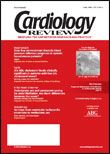Publication
Article
Cardiology Review® Online
Creatine kinase-MB elevation following coronary artery bypass graft surgery: What is its significance and should it be measured in all patients?
In their study consisting of coronary artery bypass graft (CABG) patients recruited from 4 major trials, Mahaffey found that creatine kinase-myocardial band (CK-MB) elevations following CABG surgery are independently associated with an increased risk of mortality in patients with non–ST-segment elevation acute coronary syndromes, especially if the peak CK-MB level is > 5 x the upper limit of normal (ULN).
In their study consisting of coronary artery bypass graft (CABG) patients recruited from 4 major trials, Mahaffey found that creatine kinase-myocardial band (CK-MB) elevations following CABG surgery are independently associated with an increased risk of mortality in patients with non—ST-segment elevation acute coronary syndromes, especially if the peak CK-MB level is > 5x the upper limit of normal (ULN).1 They conclude that CK-MB levels should be routinely measured in these patients because they are prognostic for late mortality and increased cardiovascular events. There are several important limitations in Mahaffey and colleagues' study. Only 17.5% of the patients in the 4 trials studied underwent CABG surgery and, of this group, only 30% of these patients were included in the analysis. The patients excluded had a higher incidence of preoperative CK-MB elevation. They were also younger and were less likely to require a reoperation, to have 3-vessel disease, or to have a major bleeding complication. We are not told what type of cardioplegia was used and how it was administered, what the actual cause of death was in the patients with higher CK-MB levels, and whether troponin levels were also measured. Furthermore, the patients with the highest CK-MB (> 10 ULN) appeared to have poor cardioprotection in the perioperative period: only 72% received aspirin, 30% received a beta blocker, 14% received an angiotensin-converting enzyme (ACE) inhibitor, and, remarkably, only 10% received a statin. These agents have been shown to significantly decrease perioperative CABG morbidity and mortality.2
Mahaffey and colleagues' conclusions have been supported by other studies, but they, too, have significant limitations. Marso and colleagues found that CK-MB > 4 ULN following CABG surgery was associated with an increased 30-day and 5-year mortality rate following isolated CABG surgery.3 This was a post-hoc analysis performed on registry data with only a single CK-MB measurement obtained 15 hours after CABG surgery. In this series, 95% of patients had an elevated CK-MB level following surgery, but only those levels > 4 x ULN were associated with increased mortality. As in Mahaffey and colleagues' study, the use of beta blockers (47%), ACE inhibitors (28%), aspirin (12%), and statins (41%) was significantly lower than expected for this patient population. Klatte and colleagues, using a subset of CABG surgery patients from the Guard During Ischemia Against Necrosis (GUARDIAN) trial, which examined the efficacy of a Na+/H+ exchange inhibitor,4 and Costa and colleagues, in the Arterial Revascularization Therapies Study (ARTS) trial, also showed that a CK-MB level > 5 x ULN was associated with increased short-term mortality and a higher incidence of future cardiovascular events.5
In view of these results, should we obtain serial CK-MB levels in all CABG surgery patients? Do elevated perioperative CK-MB levels provide us with important information to better manage these patients? I do not routinely obtain cardiac enzymes in my practice of CABG surgery. The additional cost of these studies does not justify their routine use. One of the limitations of previous studies is that elevated CK-MB levels have not been correlated with routine perioperative tests to determine cardiac injury, such as echocardiography, electrocardiograms (ECGs), the incidence of low cardiac output syndrome, or the need for inotropic support. Indeed, in the studies by Klatte and colleagues and Costa and colleagues, patients with increased CKMB levels had lower postoperative ejection fractions, a higher incidence of ECG changes and congestive heart failure (CHF), and an increased need for inotropic support.4,5 In my experience, elevated perioperative CKMB levels are rarely an isolated finding. They are usually associated with other signs of myocardial dysfunction: new Q waves on an ECG, prolonged need for inotropic support, increased utilization of the intra-aortic balloon pump (IABP), new wall motion abnormalities and decreased ejection fraction on postoperative echocardiograms, and the development of CHF. Regardless of any perioperative enzyme rise, all CABG surgery patients should be started on and discharged receiving aspirin, a beta blocker, an ACE inhibitor, and a statin whenever possible. One can only hypothesize that the long-term outcomes of those patients with elevated enzymes would have been so much better if more than 90% had been discharged on these cardioprotective agents.
In summary, patients with markedly elevated (> 5 x ULN) CK-MB levels following CABG surgery will have sustained a significant myocardial injury, which predisposes to decreased short- and long-term survival and increased cardiovascular events. These elevated enzyme levels are invariably associated with new ECG changes, new wall motion changes and evidence of reduced ejection fraction on echocardiographic analysis, and the need for increased inotropic and IABP support. Cardioprotective strategies, which include the use of aspirin, beta blockers, ACE inhibitors, and statins, should be instituted immediately and maintained as lifelong therapy.
I do not recommend that CK-MB levels be obtained on all CABG surgery patients, but only in a small cohort that includes patients: (1) with ongoing ischemia immediately prior to surgery; (2) who have difficulty separating from cardiopulmonary bypass; (3) who require an intraoperative or postoperative IABP and those who require increasing inotropic support; and (4) who develop new wall motion abnormalities on intraoperative transesophageal echocardiography, new Q waves, or ST-segment elevation immediately following surgery. The selective use of cardiac enzymes will decrease hospital costs while increasing the clinician's ability to predict which patients may be at risk for future cardiovascular events.






